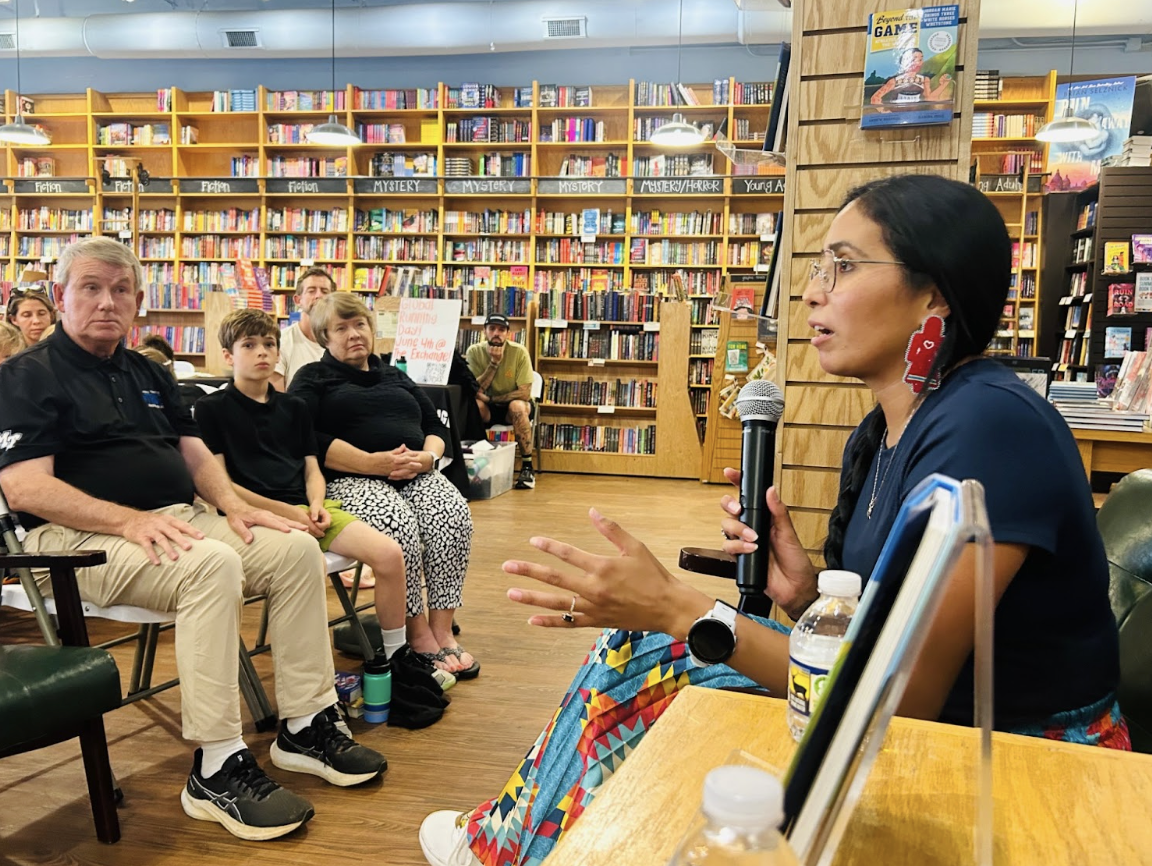
- Details
- By Kaili Berg
A new illustrated children’s biography is bringing national attention to the story of Jordan Marie Brings Three White Horses Whetstone, a professional runner and passionate advocate for Indigenous rights.
The book, written by bestselling author Andrew Maraniss, is the latest installment in his Beyond the Game: Athletes Change the World series published by Penguin Random House.
It introduces young readers to Whetstone’s work around the Missing and Murdered Indigenous Women and People (MMIWP) crisis, environmental justice, and the ongoing fight against Native mascots, all told through the lens of her powerful story as a Lakota athlete.
“She’s not using the spotlight for herself,” Maraniss told Native News Online. “She’s using her platform to lift up her people, raise awareness, and push for real change.”
Maraniss, known for weaving complex social issues into accessible narratives for youth, said he was intentional about how he approached sensitive topics like the MMIWP crisis and the Dakota Access Pipeline. The goal, he said, is to educate without overwhelming young readers.
“We worked really hard to strike that balance, making the story educational, interesting, maybe even a little alarming, but never scary,” Maraniss said. “These are real issues kids and families are dealing with. So we told it in a way that encourages empathy and action.”
Whetstone was closely involved in the creation of the book, participating in multiple interviews and reviewing the manuscript to ensure cultural accuracy and respect. While not a co-author, her input shaped the final version, from language to representation.
The book has officially launched with events in Nashville and Washington, D.C., drawing standing-room-only crowds. In one emotional moment, an Indigenous woman at the D.C. event said she wished a book like this existed when she was young.
“To hear that , that’s the most meaningful thing anyone could say to me as an author,” Maraniss said.
At each event, readers, especially children, responded with curiosity and enthusiasm. Kids asked how to pronounce Whetstone’s full name in Lakota and wanted to learn more about Indigenous cultures.
The book also inspired discussions on allyship and inclusion, especially during a panel in Nashville that brought together runners from Black, Latino, LGBTQ+, and Native communities.
“Jordan’s philosophy of ‘we’re all related’ really came through,” Maraniss said. “People saw how the issues she advocates for connect with so many other struggles for justice.”
At the back of the book, Maraniss includes a What Can You Do? section that encourages young readers to take action, whether by learning more about Native history, standing up for others, or starting small projects in their own communities.
“You’re never too young to make a difference,” Maraniss said. “And these athletes show how powerful your voice can be.”
The book joins previous Beyond the Game biographies on Maya Moore, LeBron James, and Pat Tillman, each focusing on athletes who’ve used their influence for greater social causes.
More Stories Like This
Chickasaw Holiday Art Market Returns to Sulphur on Dec. 6Center for Native Futures Hosts Third Mound Summit on Contemporary Native Arts
Filmmakers Defend ‘You’re No Indian’ After Demand to Halt Screenings
A Native American Heritage Month Playlist You Can Listen to All Year Long
11 Native Actors You Should Know
Help us defend tribal sovereignty.
At Native News Online, our mission is rooted in telling the stories that strengthen sovereignty and uplift Indigenous voices — not just at year’s end, but every single day.
Because of your generosity last year, we were able to keep our reporters on the ground in tribal communities, at national gatherings and in the halls of Congress — covering the issues that matter most to Indian Country: sovereignty, culture, education, health and economic opportunity.
That support sustained us through a tough year in 2025. Now, as we look to the year ahead, we need your help right now to ensure warrior journalism remains strong — reporting that defends tribal sovereignty, amplifies Native truth, and holds power accountable.
 The stakes couldn't be higher. Your support keeps Native voices heard, Native stories told and Native sovereignty defended.
The stakes couldn't be higher. Your support keeps Native voices heard, Native stories told and Native sovereignty defended.
Stand with Warrior Journalism today.
Levi Rickert (Potawatomi), Editor & Publisher


